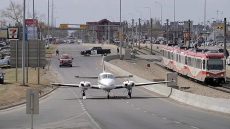OTTAWA — The Liberals have been told to consider taxing robots that displace workers, letting people pay their tax bill in kind rather than with cash, and work to prevent income inequality before it happens.
The ideas are part of a massive government effort to adapt to a rapidly changing workforce and stave off some of the strain it could cause on federal finances.
Documents obtained by The Canadian Press under the access to information law provide a window into the ideas the Liberals have been asked to consider as they modernize the social safety net and labour regulations.
All the ideas are aimed at preparing federal programs designed six decades ago for the workforce demands in the next six decades.
What the Liberals and other governments around the world are trying to respond to is increasing automation, the unbundling of work that can be done online by anyone, anywhere in the world, and more short-term jobs that are the hallmark of the "gig" economy.
Sarah Doyle, director of policy and research at the Brookfield Institute for Innovation + Entrepreneurship, said the changes will be disruptive and affect some workers more than others, requiring a response to avoid an increase in inequality.
"We're seeing changes happen that very well could become faster and magnified," she said.
"The distribution of the risks and benefits associated with automation, with digitization, with these different large scale trends will not be evenly distributed across the population."
One estimate provided to G7 labour ministers this spring said up to 15 per cent of jobs could be lost to automation over the next two decades. The jobs most at risk are farm and construction workers, accountants, lab technicians and salespeople, according to information provided to a closed-door meeting of top federal officials in December 2017.
The professions at lower risk of automation were paramedics, doctors, nurses, teachers, engineers, and journalists.
The rise of cross-border telework has also meant tasks previously done by domestic workers are unbundled and posted for international workers whose labour costs less, which federal officials worry could depress wages in Canada.
Canadian demand for this online work is larger than its share of the international labour force, signalling an area that policy-makers need to probe, said Armine Yalnizyan, an economist who researches the future of work.
Workers in this new "gig" economy — marked by more part-time and short-term contract work — are also less likely to pay into the employment insurance system funded by premiums from employers and employees. A June 2017 briefing to Canada's labour minister said online platforms were "providing new ways to avoid employer-sponsored benefits and other financial burdens."
Federal officials who were part of the discussion expressed concerns that the trend could deal a fatal fiscal blow to the federal social safety net.
Avoiding this fate encompasses a range of solutions, according to the documents.
The October 2017 brainstorming sessions included recommendations to pay each Canadian a guaranteed minimum income, which would replace various targeted social benefits. Another idea was to allow Canadians to pay their tax bills through non-cash payments like volunteering to do work for the federal government.
Rejigging labour rules to give workers more bargaining power could be part of a push towards "pre-distribution" to boost market incomes instead of relying on government benefits to redistribute income and even out inequality.
"Increasingly over the last 50 years, we have seen the bargaining position of workers erode and unless there are measures that can actually improve the way in which workers can bargain for themselves, then we are totally reliant on government to fix everything. And that cannot be," Yalnizyan said.
Lifelong learning has also been a key issue to allow workers to repeatedly drop out of the workforce to upgrade their skills and adapt to changing employment needs, particularly those workers who don't have digital skills and could find themselves replaced by a robot. There was also a proposal to use technological advances, like 3-D printing, to reduce the costs of goods.
And as for those robots? Officials suggested taxing technology that displaces a warm-bodied worker, or require that a portion of the automated work be directed toward a social good.
The October 2017 brainstorming session report said the range of policy options hadn't been fully assessed for "usefulness, impact and feasibility." Instead, the ideas represented "the beginning of a discussion about how to respond to the changing nature of work."
Labour Minister Patty Hajdu said she believed the government was getting close to finding some of the solutions.
"It's not that we haven't had change in the world of work before. It's the rapid pace of change I think that is concerning to many Canadians," she said in an interview.
"But I also don't necessarily have the same doom and gloom...as maybe some of our opposition parties have because I actually think that there are opportunities in the innovation and in the change."





